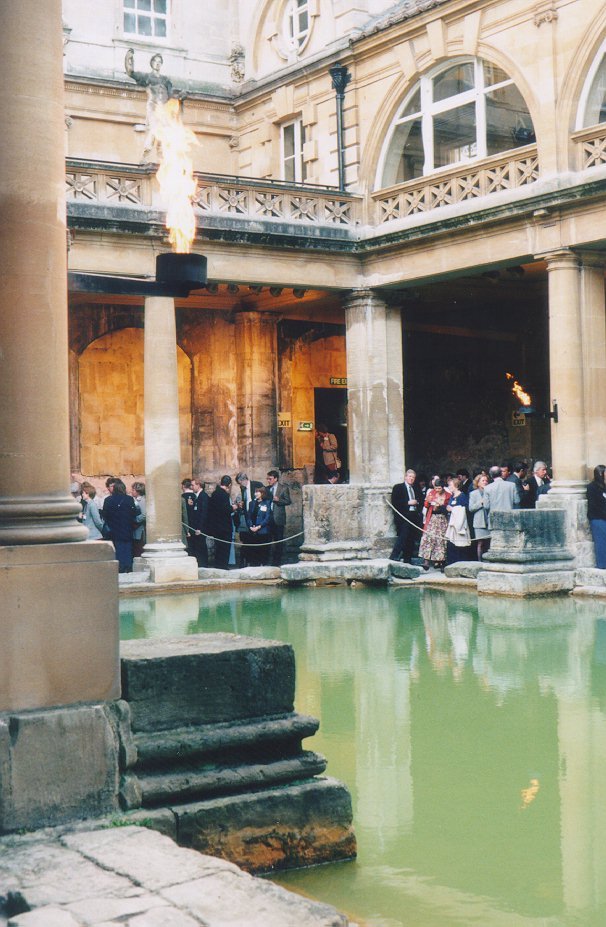Information Ecosystems
The third UKOLN international conference devoted to Networking and the future of libraries was the place where decontextualisation met rechaoticisation. Inhabiting a world of URLs, it seems, has given us a taste for lengthy character strings. The conference was held in Bath, which triumphed as always as a venue, from 29 June - 1 July. In the report which follows, shortage of space requires that not every paper from this fascinating conference can be discussed.
Decontextualisation was what Richard Heseltine (University of Hull) railed against in his opening keynote paper. Virtual libraries, he argued, repeat the error of physical libraries in separating information from its context in teaching, learning and research. Using a clip from Jurassic Park to prove that the generations of learners now growing up are very comfortable with virtual environments, he cited MODELS as a development capable of reuniting work space with information space.

But how does MODELS serve to eliminate the virtual library? Surely libraries, whether virtual or real, unite information with learning? Lorcan Dempsey (UKOLN) also drew attention to the MODELS Information Architecture (MIA), with its key aim of ‘hiding differences from the user’. The great danger with a virtual library is that what it yields on the surface may only appear to satisfy an information query. Dempsey worried about the ‘BIDS factor’ - ‘if it’s not in BIDS, it doesn’t exist’. MIA’s aim is to take users deeper into layers of resources which are useful to their queries. Already, by the second paper, we had realised that the "landscape" of the conference title (Information Landscapes for a Learning Society) was an inadequate metaphor.
David Kay of Fretwell-Downing Informatics expanded upon the MIA theme. He argued for the role of virtual libraries as brokers across curatorial traditions, subject domains and media types. The acknowledgement of different curatorial traditions was particularly appropriate at a conference which provided a platform for speakers from the worlds of cultural heritage (museums and national archives) and public libraries, as well as academic libraries. A critical link between the information and learning contexts has always been in the metadata supplied by libraries. To Kay, "metadata is king", key to the efficient exploitation of a virtual world of "atomic information objects" which can be repackaged and repurposed endlessly to suit user needs - provided that the rights problems can be overcome.
Peter Lyman (University of California Berkeley) described "an ecology of learning", and it was clear by now that ecology - evoking dynamic processes and interconnectedness - was the metaphor at the heart of the conference. Lyman challenged us to dispel the caricature of the "Net-nerd". Real, supportive communities inhabit digital space, and learning communities derive great value from it. For years the cry has been that the Internet is full of junk - "but somebody loves that junk". Andrew Blau, of the US Benton Foundation, does not. His paper addressed the social changes arising from the rise of a "richly networked society", and considered the Internet as a "solvent", which was creating the "rechaoticisation of the information space". Information on the Net is out of control, a predator, preying on us. In his world, the ecology of public communication is in a state of serious malfunction, flooded with information which cannot be processed. Frank Webster (Oxford Brookes University) had a similar theme. Far from "loving that junk", Webster claimed that what the Internet provides is "worthless and noxious information". Ray Lester, of The National History Museum, was concerned less with the value of the available information, than with the means of controlling it. Looking at information from the opposite end of the telescope from Peter Lyman, he asked "Who’s in command?"
To those for whom the landscape has only begun to be explored, the future looks bright. John Dolan of Birmingham Metropolitan District Council, and Grace Kempster of Essex County Council, both welcomed the learning age and the UK government’s funding of it with open arms. Sunderland and Sheffield also made claims, via Andrew McDonald (University of Sunderland) and Biddy Fisher (Sheffield Hallam University), to be "learning cities", with FE, HE and public libraries working in partnership to enfranchise citizens with learning opportunities. However, Bob Fryer of Northern College, author of the report of the National Advisory Group for Continuing Education and Lifelong Learning, took a less optimistic view. "We are nowhere near the learning age" he stated, and our approach to creating it is "full of hubris and danger". We need to wake up to the social dangers lurking in the great education failure rate of our schoolchildren. In this bleak scenario, lifelong learning had become much too little, much too late. Clifford Lynch (US Coalition for Networked Information) gave the closing keynote address. Ranging fluently and thoughtfully over a number of issues, Lynch spoke of the need to preserve in the digital age the traditional library users’ expectations of privacy and anonymity in their use of information. The library community in the US, he stated (perhaps because it had not received government money on the scale of that now on offer in the UK) had been active in raising questions about the direction of information access in the age of the Internet. Citing examples of commercial sharp practice, such as word-stuffing, metadata spamming and other dirty tricks designed to fool the commercial search engines, themselves engaged in a "modest arms race", Lynch spoke of the role of libraries as "trusted third parties" in description. Echoing David Kay, he saw the way forward as lying in partnerships between public and commercial information providers. Having charted the landscape and analysed many of the interlocking systems in the new information ecology which is changing society, according to one speaker, even more radically than the Industrial Revolution, we finished a provoking and at times disturbing conference on an eco-friendly note.
Author Details
John MacCollProject Director, Ariadne
Email: john.maccoll@ed.ac.uk
